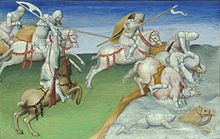Lyubo, bratsy, lyubo
| "Любо, братцы, любо" | |
|---|---|
| Song | |
| Language | Russian |
| English title | Lovely, brothers, lovely |
| Genre | Folk |
| Songwriter(s) | Traditional |
"Lyubo, bratsy, lyubo" (Template:Lang-ru, Template:Lang-uk lit. Lovely, brothers, lovely) is a traditional Cossack song known in Russian and Ukrainian languages. Its name derived from the first row of the refrain: Lyubo, bratsy, lyubo, lyubo, bratsy, zhit' (Template:Lang-ru, Template:Lang-uk), that means "it is lovely to live, brothers". The song was first recorded by Ukrainian folklorists in the South of Kherson Oblast and was popular with Nestor Makhno's troops in Ukraine in the beginning of 1920s.[1] It also became very popular in the Soviet Union during wartime after the release of the Soviet film Alexander Parkhomenko (1942) where it was performed in Russian by Boris Chirkov.
Synopsis

The Cossacks (in some versions: Tatars,[2] etc.) led 40,000 horses to the Terek River. After the bloody battle, one bank of the Terek is covered by the dead men and animals. The fatally wounded hero remembers about his wife, his mother, and his steed. Feeling sorrow for the two latter, he mourns his fate.
Historical background
The phrase "Lyubo, bratsy, zhit'" (Template:Lang-ru) appeared in a soldier song published in Biblioteka Dlya Chteniya, 1837.[3][4]
According to several authors, the song is dedicated to the events of the Russian Civil War (1917 – 1922).[5][6] Other sources mention it as a piece of Cossack folklore.[7][8] The song was recorded in Ukrainian by folklorists in the South of Kherson Oblast and was popular with Nestor Makhno's troops in Ukraine in the beginning of 1920s.[9]
The song became extremely popular after the release of the Soviet film Alexander Parkhomenko (1942) where it was performed by Boris Chirkov. In 1942 – 1943, a tankers adaptation was created, based on the Chirkov's version.[10][11]
Performance
The song was popularized by such well-known Russian and Soviet artists as the Kuban Cossack Choir, Zhanna Bichevskaya,[12] Pelageya,[13] etc.
References
- ^ Ukrainska Pravda. ЯСКРАВІ ВРАЖЕННЯ (13). Останній день незалежності з Махном в Гуляйполі.
- ^ "[Article]". Roman-Gazeta (in Russian) (1277–1282). 1996.
- ^ Nikolaev, Petr Alekseevich; Baskakov, V. N., eds. (1989). Русские писатели, 1800-1917: биографический словарь. А—Г. Русские писатели 11-20 вв. серия биографических словарей (in Russian). Vol. 1. Moscow: Советская энциклопедия. ISBN 978-5-85270-136-7. LCCN 89208448. OCLC 21334760.
- ^ See original text, Biblioteka Dlya Chteniya, vol. XX, p. 92.
- ^ "[Article]". Театр (in Russian) (5–8). Искусство. 1989.
- ^ Чекалин, Сергей (2002). Под солнцем юга: кавказские войны в лицах (in Russian). M.: Воскресенье.
- ^ Жигунова, Марина (2004). Этнокультурные процессы и контакты у русских Среднего Прииртышья во второй половине XX века (in Russian). Nauka.
- ^ Ryabov, Oleg; Goscilo, Helena (2007). "Россия-Матушка": национализм, гендер и война в России ХХ века (in Russian). Ibidem Verlag. ISBN 978-3-89821-487-2.
- ^ Ukrainska Pravda. ЯСКРАВІ ВРАЖЕННЯ (13). Останній день незалежності з Махном в Гуляйполі.
- ^ "[Article]". Novy Mir (in Russian) (5–8). 1990.
- ^ "[Article]". Литературный европеец (in Russian) (101–106). 2006.
- ^ "Бичевская Жанна Владимировна". Эстрада России. XX век. Энциклопедия (in Russian). Олма-Пресс. 2004. p. 77. ISBN 978-5-224-04462-7.
- ^ "[Article]". Rabotnitsa (in Russian). 2006.
External links
- Pavlov, Sergey. "Translation of the song". Archived from the original on 2018-03-09. Retrieved 2018-03-09.
- Lyubo, bratsy, lyubo by Kuban Cossack Choir on YouTube
